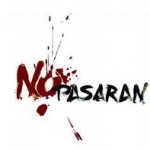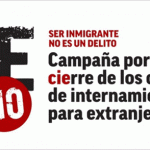Tagged: anti-semitism
The Rise of Neo-Nazism in the Party Political System
Pro Igual joins No Hate Speech Movement

Pro Igual has joined numerous NGOs and individuals across Europe forming part in No Hate Speech Movement.
The campaign is against hate speech online in all its forms, including cyber-bullying and cyber-hate. The campaign is not designed to limit freedom of expression online. Neither is it about everyone being nice to each other online. The campaign is based upon human rights education, youth participation and media literacy.
Through participation in the Movement Pro Igual hopes to raise awareness of extreme intolerance experienced by members of our target groups – especially minorities and foreigners – and stop and prevent hate crimes that unfortunately have become a fact of life in Spain.
To read more, please visit here.
FRA Director holds speech on combating hate crime in Europe and beyond
FRA Director Morten Kjaerum held a speech entitled Innocent figures: why we need more facts at the conference ‘Right-wing extremism and hate crime: minorities under pressure in Europe and beyond’ in Oslo on 14-15 May.
He began by talking of the gaps in data collection that can impede the search for lasting and effective solutions to the phenomenon of hate crime. This leaves the majority of such crimes unrecognised, unprosecuted and therefore invisible. The gaps are due both to under-reporting by victims, who often lack confidence in the authorities’ ability to afford them protection, and to under-recording by national governments. At present, only four EU Member States collect comprehensive data on hate crime, while differences of classification in national crime statistics often make it impossible to make comparisons between countries.
FRA research shows clearly that hate crime is a major problem in the EU today. This is particularly the case in the wake of the EU’s economic crisis, with violent extremism on the rise in a number of countries. Of the 93,000 respondents to FRA’s 2012 LGBT survey, 26% had experienced violence in the five years preceding the survey, with the figure rising to 35% for transgender people. In a survey of Jewish communities, FRA found that 26% had experienced some form of harassment in the 12 months preceding the survey.
The Director emphasised that hate crime transcends the experiences of the individuals directly involved, as homophobic, racist and other crimes motivated by prejudice create an ‘us’ and ‘them’ mentality that harms entire groups and society as a whole. This means it is all the more important for countries to introduce enhanced penalties for bias-motivated crimes, thus making perpetrators fully accountable for their actions.
At the end of his speech, the Director underlined the fact that hate crime is not just a phenomenon that affects a few individuals marginal to society, but a direct attack on the democratic principle of equality and the assumption that each person in a democratic society can live without fear of violence and discrimination.
Original link: http://fra.europa.eu/en/news/2013/fra-director-holds-speech-combating-hate-crime-europe-and-beyond
ICSR Insight: The New Far Right – 10 Issues and Questions

This ICSR Insight highlights 10 major themes, issues and questions that have emerged from the conference. As will be shown, the New Far Right is a new and unique challenge for Western democracies which policymakers and experts have yet to fully understand. Their success in doing so is key to making sure that modern multicultural societies remain peaceful and cohesive.
By Peter R. Neumann, ICSR Director
The original link: http://icsr.info/2013/04/icsr-insight-the-new-far-right-10-issues-and-questions/
Last month, ICSR – in partnership with the Community Security Trust and the Swedish National Defence College – hosted an important conference on the New Far Right, bringing together nearly 100 stakeholders from academia, politics, the media, and grassroots initiatives.
This ICSR Insight highlights 10 major themes, issues and questions that have emerged from the conference. As will be shown, the New Far Right is a new and unique challenge for Western democracies which policymakers and experts have yet to fully understand. Their success in doing so is key to making sure that modern multicultural societies remain peaceful and cohesive.
1) “The threat is real”. As the UK’s Security Minister, James Brokenshire, noted, the threat from far-right terrorism is significant, albeit “not as systematic or widespread as the al Qaeda inspired [terrorist] threat”. In UK prisons, there are currently 17 individuals who have been charged with or convicted for terrorist offences “associated with far-fight extremism”.
2) Conspiracy theory. The New Far Right is inspired – in part – by a conspiracy theory according to which Western Muslims, allied with liberal governments, plan to destroy Western democracies and replace them with a Caliphate . This movement calls itself ”Counter-Jihad”.
3) Public disorder and social cohesion. More so than terrorism, New Far Right activists have been involved in street violence and acts of public disorder. Their aggressive rhetoric divides communities and undermines social cohesion. They also campaign against the use of Islamic practices – such as ritually slaughtered halal meat.
4) Old vs. New Far Right. There are striking differences between the “old” (neo-Nazi) Far Right and so-called Counter-Jihad members like Anders Breivik. However, there also exist many similarities, and it would be wrong to ignore the continued threat from “old” far-right groups in countries such as Greece and Germany.
5) Echoes of extremism. In the British context, the New Far Right and Islamist extremists seem to be in a symbiotic relationship, confirming each other’s stereotypes and providing motives and justifications for mobilising their respective sympathisers.
6) Addressing grievances. New Far Right activism is often rooted in social, economic and cultural fears about immigration. Mainstream politicians from across the political spectrum have failed to articulate these concerns in a way that would undercut the support for far-right extremists.
7) Emerging structures. The structures of the New Far Right are increasingly pan-European, with leaders and activists from different countries coming together for joint campaigns, as well as trying to learn from each other’s successes and mistakes.
8) The Internet matters. Social media, blogs and video-sharing sites are key to understanding how the New Far Right disseminates its message, mobilises its followers, and retains a sense of cohesion despite the lack of centrally organised structures.
9) Countering the New Far Right. Government counter-radicalisation programmes – such as the British PREVENT – have mostly focused on Islamist extremism. Policymakers need to understand what lessons have been learned and how those programmes can be applied to the New Far Right.
10) Connecting the dots. For researchers, the principal task is to bring together expert communities dealing with terrorism, far-right extremism and other related threats, so that different bodies of knowledge can be better integrated.
The conference was part of ICSR’s ongoing efforts to make sense of the evolving nature of far-right extremism. For some of our recent publications on this issue, see:
- Alexander Meleagrou-Hitchens and Hans Brun, A Neo-Nationalist Network: The English Defence League and Europe’s Counter-Jihad Movement (London: ICSR, 2013)
- J.M. Berger and Bill Strathearn, Who Matters Online: Measuring Influence, Evaluating Content and Countering Violent Extremism in Online Social Networks (London: ICSR, 2013)
The conference can be watched in full on the ICSR YouTube channel.
FRA brief: Crimes Motivated by Hatred and Prejudice in the EU
The March 2013 brief by the EU Agency for Fundamental Rights (FRA) provides information about the situation on the ground in the EU as well as suggestions for the way in which the EU and its Member States could better address crimes motivated by hatred and prejudice.

 July 6th, 2013
July 6th, 2013 



